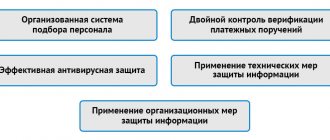Composition of the crime and qualifying characteristics
The corpus delicti under Art. 160 of the Criminal Code of the Russian Federation (misappropriation or embezzlement of someone else’s property) occurs under certain circumstances. According to Part 1. Art. 160 these circumstances are:
- act (theft of someone else's property entrusted to the perpetrator);
- subject (kidnapper);
- object (property entrusted to the thief).
The essence of these circumstances is revealed in the relevant legislative and regulatory acts:
- theft in the Criminal Code of the Russian Federation is an illegal gratuitous seizure and/or circulation of someone else's property in favor of the culprit (other persons) committed for self-interest, which caused damage to the owner or another possessor (Note 1 to Article 158 of the Criminal Code of the Russian Federation);
- “entrusted” means property in respect of which the culprit, by virtue of official duties, contractual relations or special instructions from a state or public organization, exercises certain powers to dispose, manage, store and other actions with the property. Such powers can be transferred by the owner of the property to another person (persons) under contract agreements, leases, commissions and other grounds (“Methodological recommendations for identifying and suppressing crimes ...”, approved by Order of the Director of the FSSP dated April 15, 2013 No. 04-4).
These circumstances are general qualifying features of such acts as misappropriation and embezzlement. Both acts are committed for self-interest, illegally, against the will of the owner. The difference between them is as follows (clause 24 of the Resolution of the Plenum of the Supreme Court of the Russian Federation dated November 30, 2017 No. 48):
- appropriation is the use by the culprit of the property entrusted to him for his own benefit;
- embezzlement is an act that implies that the culprit has spent the property entrusted to him by consuming, spending, or transferring it to another person(s).
Simply put, when property is misappropriated, the culprit uses it, but when it is embezzled, it is lost for one reason or another.
Second commentary to Art. 160 of the Criminal Code of the Russian Federation
1. This article deals with two independent forms of theft, united by common characteristics of the subject and method of committing the crime. The peculiarity of these forms of theft is that their objective side does not include two actions: seizure of property and its circulation in favor of the offender or other persons, but only the latter, since it is already in the lawful possession of the offender and he has no need to seize it.
2. Misappropriation means the illegal conversion of someone else's property entrusted to the guilty person for his benefit without equivalent compensation. The embezzled property has not yet been alienated or consumed; it is in the possession of the culprit, who began to use it for selfish purposes.
3. Embezzlement is the illegal and gratuitous expenditure (for example, through personal consumption) or alienation (for example, through sale, transfer on credit or to pay off a debt, etc.) of someone else's property entrusted to the perpetrator, without proper compensation. It is recognized as a completed crime from the moment of actual expenditure or alienation of the entrusted property (clauses 18–19 of the resolution of the Plenum of the Supreme Court of the Russian Federation of December 27, 2007 No. 51).
4. The subject of both considered forms of theft is special - a person to whom the stolen property is entrusted to exercise the powers of disposal, management, delivery, use or storage determined by law, contract, official position of the perpetrator or special assignment (clause 18 of the same resolution).
5. Signs of qualified elements of embezzlement or embezzlement (Part 2 of Article 160 of the Criminal Code), as well as especially qualified types of these forms of theft (Parts 3 and Part 4 of Article 160 of the Criminal Code) have the same content as in fraud.
The difference between embezzlement and theft
In addition to Art. 160 the seizure of someone else's property is also spelled out in other articles of Chapter. 21 of the Criminal Code of the Russian Federation, dedicated to crimes against property, including Art. 158 "Theft". According to Part 1 of Art. 158 theft is the secret appropriation (stealing) of someone else's property. In accordance with the provisions of paragraph 2 of the Resolution of the Plenum of the Supreme Court dated December 27, 2002 No. 29, theft should be understood as the actions of a person who has committed an illegal seizure of property in the absence of the owner (another owner, unauthorized persons) or in their presence, but unnoticed by them.
The key difference between such acts as appropriation and retention of someone else's property, as well as its embezzlement and theft, is that the former are carried out in relation to entrusted property.
Thus, the embezzlement of an enterprise’s funds or the appropriation of state property by a person to whom it was entrusted and who had access to it will be qualified under Art. 160 of the Criminal Code of the Russian Federation, regardless of whether it was committed secretly or openly. If the culprit committed theft of property that was not entrusted to him, then he will “go” under Article 158 (if the theft was secret) or other articles of Chapter. 21 of the Criminal Code of the Russian Federation, for example, fraud (Article 159).
1. The applicant has the right to file a pre-trial (out-of-court) complaint against the decisions and (or) actions (inaction) of the Department and its officials taken (committed) in the provision of public services.
2. The filing and consideration of complaints is carried out in the manner established by Chapter 2.1 of the Federal Law of July 27, 2010 No. 210-FZ “On the organization of the provision of state and municipal services”, the Regulations on the specifics of filing and consideration of complaints about violations of the procedure for the provision of public services in the city of Moscow , approved by Decree of the Moscow Government of November 15, 2011 No. 546-PP “On the provision of state and municipal services in the city of Moscow”, these Regulations.
3. Applicants may file complaints in the following cases:
3.1. Violation of the deadline for registering a request (application) and other documents necessary for the provision of public services.
3.2. Requirements from the applicant:
3.2.1. Documents or information or the implementation of actions, the provision or implementation of which is not provided for by the regulatory legal acts of the Russian Federation and the city of Moscow for the provision of public services, including documents obtained using interdepartmental information interaction.
3.2.2. Applications for the provision of services not included in the list of services approved by the Moscow Government that are necessary and mandatory for the provision of public services.
3.2.3. Payment of fees for the provision of public services not provided for by regulatory legal acts of the Russian Federation and the city of Moscow.
3.2.4. Documents or information, the absence and (or) unreliability of which was not indicated during the initial refusal to accept the application and documents necessary for the provision of a public service, or in the provision of a public service, except for the cases provided for in paragraph 4 of part 1 of Article 7 of the Federal Law of July 27 2010 N 210-FZ “On the organization of the provision of state and municipal services.”
3.3. Violations of the deadline for the provision of public services.
3.4. Refusal to the applicant:
3.4.1. In accepting documents, the submission of which is provided for by the regulatory legal acts of the Russian Federation and the city of Moscow for the provision of public services, on grounds not provided for by the regulatory legal acts of the Russian Federation and the city of Moscow.
3.4.2. In the provision of public services on grounds not provided for by the regulatory legal acts of the Russian Federation and the city of Moscow.
3.4.3. In the correction of typographical errors and errors in documents issued as a result of the provision of public services, or in case of violation of the established deadline for such corrections.
3.5. Other violations of the procedure for providing public services established by regulatory legal acts of the Russian Federation and the city of Moscow.
4. Complaints about decisions and (or) actions (inaction) of officials, state civil servants of the Department are considered by the head of the Department (the authorized deputy head of the Department).
Complaints about decisions and (or) actions (inaction) of the head of the Department, including decisions made by him or his deputy on complaints received in a pre-trial (extrajudicial) manner, are considered by a higher executive body of the city of Moscow in accordance with clauses 5.6, 6 of the appendix 6 to the resolution of the Moscow Government of November 15, 2011 No. 546-PP “On the provision of state and municipal services in the city of Moscow.”
5. Complaints can be submitted to the bodies authorized to consider them in writing on paper or electronically in one of the following ways:
5.1. Upon personal application by the applicant (applicant’s representative).
5.2. By post.
5.3. Using the Portal if technically possible.
5.4. Using the official website of the Department on the Internet.
6. The complaint must contain:
6.1. The name of the body authorized to consider the complaint or the position and (or) surname, first name and patronymic (if any) of the relevant official to whom the complaint is sent.
6.2. The name of the executive authority of the city of Moscow or the position and (or) surname, first name, patronymic (if any) of the official, state or municipal employee, employee, whose decisions and actions (inaction) are being appealed.
6.3. Last name, first name, patronymic (if any), information about the place of residence of the applicant - an individual, including one registered as an individual entrepreneur, or name, information about the location of the applicant - a legal entity, as well as contact telephone number(s), address (addresses) email (if available) and postal address to which the response should be sent to the applicant.
6.4. The date of submission and registration number of the request (application) for the provision of a public service (except for cases of appealing the refusal to accept the request and its registration).
6.5. Information about decisions and (or) actions (inactions) that are the subject of appeal.
6.6. Arguments on the basis of which the applicant does not agree with the appealed decisions and (or) actions (inactions). The applicant may submit documents (if any) confirming the applicant’s arguments, or copies thereof.
6.7. Applicant's requirements.
6.8. List of documents attached to the complaint (if any).
6.9. Date of filing the complaint.
7. The complaint must be signed by the applicant (his representative). If a complaint is filed in person, the applicant (applicant's representative) must provide an identification document.
The authority of the representative to sign the complaint must be confirmed by a power of attorney issued in accordance with the law.
The powers of a person acting on behalf of an organization without a power of attorney on the basis of the law, other regulatory legal acts and constituent documents are confirmed by documents certifying his official position, as well as the constituent documents of the organization.
The status and powers of legal representatives of an individual are confirmed by documents provided for by federal laws.
8. A received complaint must be registered no later than the working day following the day of receipt.
9. The maximum period for consideration of a complaint is 15 working days from the date of its registration. The period for consideration of the complaint is 5 working days from the date of its registration in cases of appeal by the applicant:
9.1. Refusal to accept documents.
9.2. Refusal to correct typos and errors made in documents issued as a result of the provision of public services.
9.3. Violations of the deadline for correcting typos and errors.
10. Based on the results of consideration of the complaint, a decision is made to satisfy the complaint (in whole or in part) or to refuse satisfaction.
11. The decision must contain:
11.1. The name of the executive authority that considered the complaint, position, surname, first name, patronymic (if any) of the official who made the decision on the complaint.
11.2. Details of the decision (number, date, place of adoption).
11.3. Last name, first name, patronymic (if any), information about the place of residence of the applicant - an individual or name, information about the location of the applicant - a legal entity.
11.4. Last name, first name, patronymic (if any), information about the place of residence of the applicant’s representative who filed the complaint on behalf of the applicant.
11.5. Method of filing and date of registration of the complaint, its registration number.
11.6. Subject of the complaint (information about the decisions, actions, or inactions being appealed).
11.7. The circumstances established during the consideration of the complaint and the evidence confirming them.
11.8. Legal grounds for making a decision on a complaint with reference to the applicable regulatory legal acts of the Russian Federation and the city of Moscow.
11.9. The decision taken on the complaint (conclusion on the satisfaction of the complaint or refusal to satisfy it).
11.10. Measures to eliminate identified violations and deadlines for their implementation (if the complaint is satisfied).
11.11. Information about the actions taken by the body providing the public service in order to immediately eliminate identified violations in the provision of the public service, as well as an apology for the inconvenience caused and information about further actions that the applicant needs to take in order to receive the public service (if the complaint is satisfied).
11.12. Reasoned explanations about the reasons for the decision made (in case of refusal to satisfy the complaint).
11.13. Procedure for appealing a decision.
11.14. Signature of the authorized official.
12. The decision is made in writing using official forms.
13. The measures to eliminate identified violations specified in the decision include:
13.1. Cancellation of previously made decisions (in whole or in part).
13.2. Ensuring the acceptance and registration of the request, execution and issuance of a receipt to the applicant (in case of evasion or unreasonable refusal to accept documents and their registration).
13.3. Ensuring registration and delivery to the applicant of the result of the provision of a public service (in case of evasion or unreasonable refusal to provide a public service).
13.4. Correction of typos and errors made in documents issued as a result of the provision of public services.
13.5. Refund to the applicant of funds, the collection of which is not provided for by the regulatory legal acts of the Russian Federation and the city of Moscow.
14. The body authorized to consider the complaint refuses to satisfy it in the following cases:
14.1. Recognition of the appealed decisions and actions (inactions) as legal and not violating the rights and freedoms of the applicant.
14.2. Filing a complaint by a person whose powers have not been confirmed in the manner established by regulatory legal acts of the Russian Federation and the city of Moscow.
14.3. The applicant does not have the right to receive public services.
14.4. Availability:
14.4.1. A court decision on the applicant’s complaint with identical subject matter and grounds that has entered into legal force.
14.4.2. Decisions on a complaint made earlier in a pre-trial (out-of-court) manner in relation to the same applicant and on the same subject of the complaint (except for cases of appealing previously made decisions to a higher authority).
15. The complaint must be left unanswered on its merits in the following cases:
15.1. The presence in the complaint of obscene or offensive language, threats to the life, health and property of officials, as well as members of their families.
15.2. If the text of the complaint (part of it), last name, postal address and email address are not readable.
15.3. If the complaint does not indicate the name of the applicant (the applicant's representative) or the postal address and email address to which the response should be sent.
15.4. When the body authorized to consider the complaint receives a request from the applicant (the applicant’s representative) to withdraw the complaint before a decision is made on the complaint.
16. Decisions to satisfy the complaint or to refuse to satisfy it are sent to the applicant (the applicant’s representative) no later than the working day following the day of their adoption, to the postal address specified in the complaint. At the request of the applicant, the decision is also sent to the email address specified in the complaint (in the form of an electronic document signed with the electronic signature of an authorized official). In the same manner, the applicant (the applicant’s representative) is sent a decision on the complaint, in which only an email address is indicated for the response, and the postal address is missing or cannot be read.
17. If the complaint is left unanswered on the merits, the applicant (his representative) is sent, no later than 5 days from the date of registration of the complaint, a written motivated notification indicating the grounds (except for cases where the complaint does not indicate a postal address and email address for a response or they are unreadable). The notice is sent in the manner established for sending a decision on a complaint.
18. A complaint filed in violation of the rules on competence established by paragraph 5.4 of these Regulations is sent no later than the working day following the day of its registration to the body authorized to consider the complaint, with simultaneous written notification to the applicant (his representative) about the redirection complaints (except for cases where the complaint does not indicate a postal address and email address for a response or they are not legible). The notice is sent in the manner established for sending a decision on a complaint.
19. Filing a complaint in a pre-trial (out-of-court) manner does not exclude the right of the applicant (applicant’s representative) to simultaneously or subsequently file a complaint in court.
20. Informing applicants about the judicial and pre-trial (extrajudicial) procedure for appealing decisions and (or) actions (inactions) committed in the provision of public services should be carried out by:
20.1. Posting relevant information on the Portal.
20.2. Consulting applicants, including by telephone, email, and in person.
21. If, during or as a result of consideration of a complaint, signs of an administrative offense or crime are established, the official empowered to consider the complaint immediately forwards the available materials to the prosecutor's office.
If violations of the procedure for the provision of public services of the city of Moscow are identified, the responsibility for which is established by the Code of the City of Moscow on Administrative Offenses, the official empowered to consider the complaint must also send copies of the available materials to the Main Control Department of the city of Moscow within two working days following after the day the decision on the complaint was made (but no later than the working day following the day of expiration of the period established by federal legislation for consideration of complaints about violations of the procedure for the provision of public services).
What is the punishment for misappropriation and embezzlement?
Punishment for appropriation of someone else's property, misappropriation of funds, embezzlement of entrusted property is determined by the circumstances under which the crime was committed. For misappropriation and embezzlement of someone else's property under Art. 160 of the Criminal Code of the Russian Federation, the culprit faces:
- for an ordinary act (without aggravating circumstances) from a fine of up to 120 thousand rubles or in the amount of the culprit’s income for a period of up to 1 year before imprisonment for up to 2 years (part 1);
- for an act committed by a group of persons or by prior conspiracy, as well as in a significant amount from a fine to 300 thousand rubles or in the amount of the income of the culprit for a period of up to 2 years before imprisonment for up to 5 years plus restriction of freedom for up to 1 year or without it (part 2);
- for an act committed using an official position, as well as in a large amount from a fine of 100 thousand to 500 thousand rubles or in the amount of the income of the culprit for the period from 1 year to 3 years before imprisonment up to 6 years plus a fine up to 10 thousand rubles or in the amount of the culprit’s income for a period of up to 1 month or without it, plus restriction of freedom for up to 1.5 years or without it (Part 3);
- for the act provided for in Parts 1-3 of Art. 160, committed by an organized group, as well as embezzlement or embezzlement of property on an especially large scale, imprisonment for up to 10 years plus a fine of up to 1 million rubles or in the amount of the culprit’s income for a period of up to 3 years or without it, plus restriction of freedom for up to 2 years. x years or without it (part 4).
Let us present the quantitative parameters of the amount of theft, which are regulated by the provisions of Art. 158 of the Criminal Code of the Russian Federation:
- significant - from 5 thousand rubles;
- large – from 250 thousand rubles;
- especially large – from 1 million rubles.
The statute of limitations under Article 160 of the Criminal Code of the Russian Federation depends on the maximum penalty (Article 78 of the Criminal Code of the Russian Federation) and is (Article 15 of the Criminal Code of the Russian Federation):
- 2 years according to part 1;
- 6 years according to part 2;
- 10 years for parts 3 and 4.
The jurisdiction of criminal cases of misappropriation and embezzlement of property is regulated by the Code of Criminal Procedure of the Russian Federation. According to clause 3, part 2, art. 151 of the Code of Criminal Procedure of the Russian Federation preliminary investigation of crimes under Art. 160 of the Criminal Code of the Russian Federation, conducted by investigators from internal affairs bodies. In addition, according to Part 5 of Art. 151 of the Code of Criminal Procedure of the Russian Federation, preliminary investigations in cases of this category can be conducted by investigators from the authorities that identified these crimes.
Arbitrage practice
In 2021, 5,745 verdicts were issued under Article 160 of the Criminal Code of the Russian Federation on misappropriation and embezzlement of property, of which:
- 1,842 for part 1;
- 1,018 for part 2;
- 2,287 for part 3;
- 598 for part 4.
For comparison: in cases of “classic” theft (Article 158 of the Criminal Code of the Russian Federation) in 2020, more than 130,000 sentences were passed.
In judicial practice under Art. 160 there are often situations where appropriation and embezzlement “neighbor” each other. Thus, the culprit first appropriates the property entrusted to him, and after some time begins to sell it. In such cases, courts consider misappropriation and embezzlement as a single (“continued”) theft with a single intent.
Sometimes courts qualify an act under Art. 160, while other articles of the Criminal Code of the Russian Federation should be applied, in particular Art. 330 "Arbitrariness". Such misclassification arises in a situation where the person to whom the property has been entrusted temporarily borrows for his own purposes with the intention of returning it, that is, without the intent of its appropriation or embezzlement.
Concept and features of crimes
According to the Criminal Code of the Russian Federation, misappropriation is the illegal handling of objects entrusted to him by a criminal pursuing a selfish goal. A special feature of the crime is the use of trespass items against the will of their owner.
Embezzlement according to the Criminal Code of the Russian Federation is the illegal consumption, expenditure or transfer by a criminal of items entrusted to him. If appropriation is characterized as withholding, then embezzlement can be considered in a practical sense as withholding (for example, sale, donation, etc.).
The differences between the acts under consideration are presented in the table:
| Comparison criterion | Assignment | Embezzlement |
| The essence of the act | adverse possession | recourse to one's own benefit (the criminal's) or third parties |
| Moment of recognition of the act as completed | at the time of removal and separation of objects from the total mass and their addition to personal property | at the time of unlawful disposal of entrusted property (i.e. completion of the process of its alienation) |
| Consideration in a practical sense | retention | withholding |








